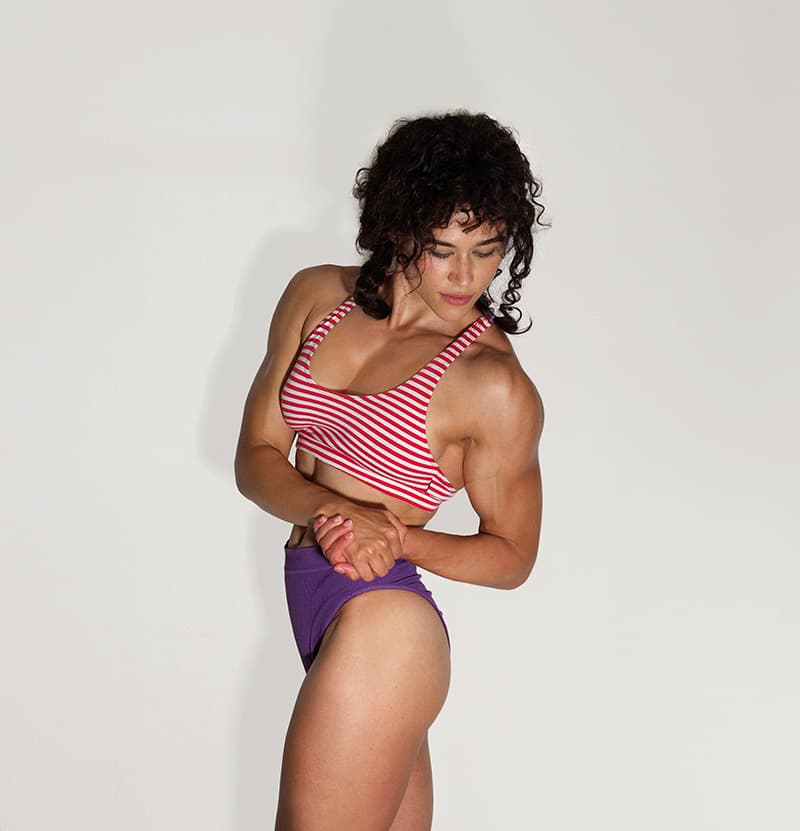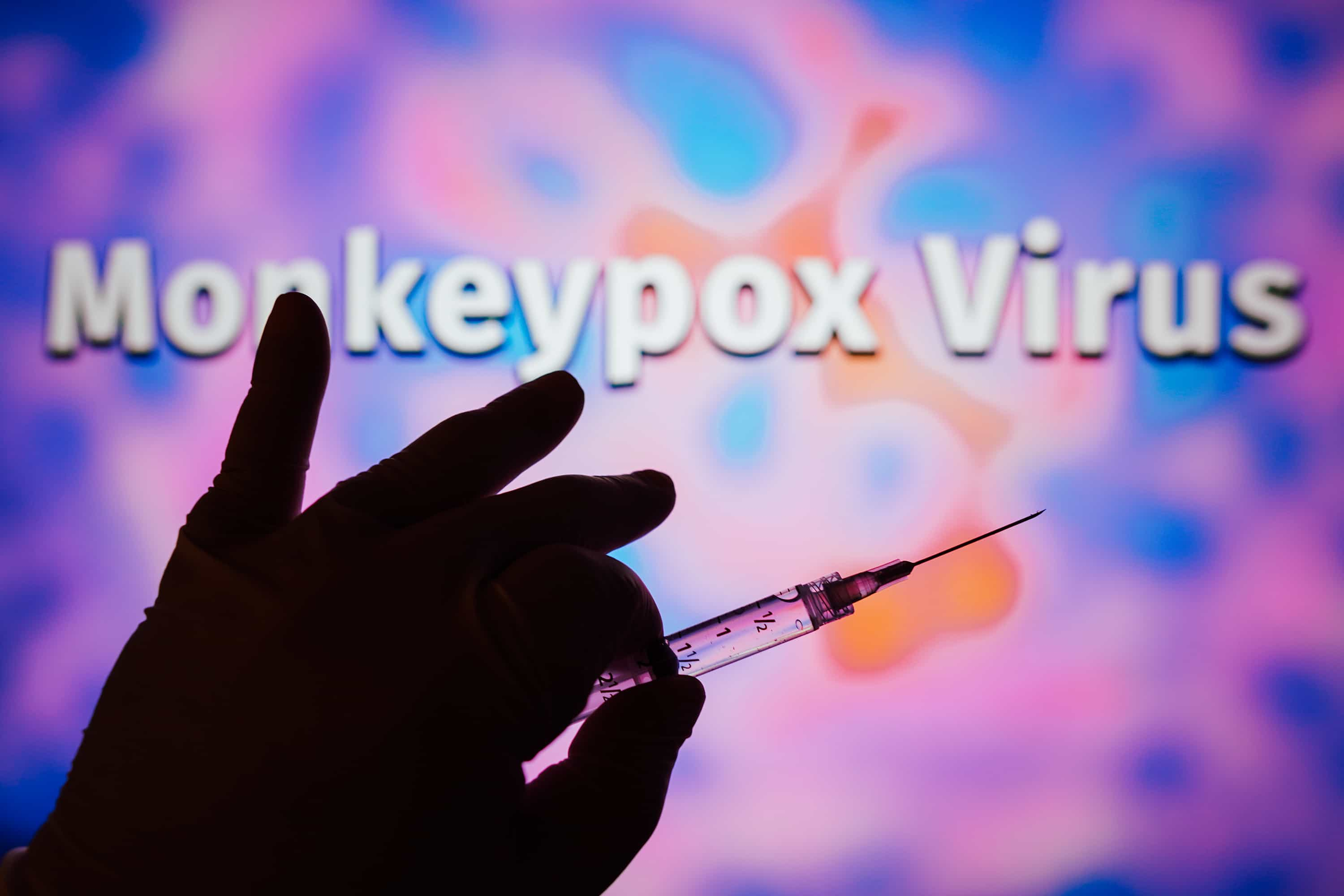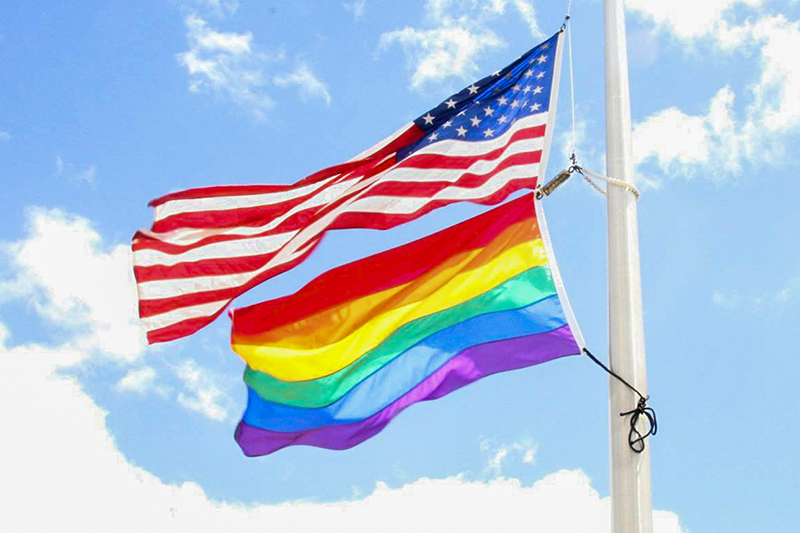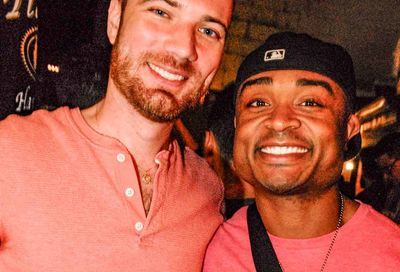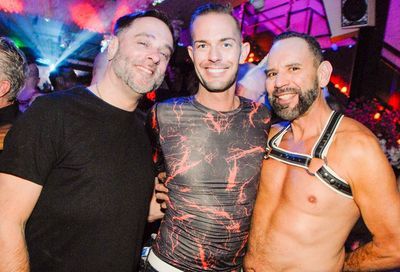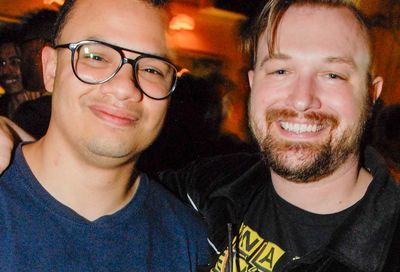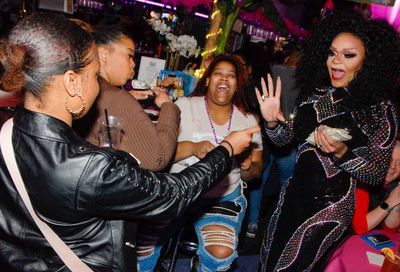11 Questions for LGBTQ Ward 1 Candidate Salah Czapary
Salah Czapary, a former police officer and Ward 1 resident, is one of two openly gay men running for a seat on the D.C. Council.

“It was always a childhood dream of mine to be a police officer,” says Salah Czapary, an openly gay Democrat and former officer for the Metropolitan Police Department of D.C. who is now seeking the Ward 1 seat on the D.C. Council.
“I was obsessed with Walker, Texas Ranger as a kid,” he continues. “I think part of that is the way we portray police in our movies and TV shows. They’re people that are problem solvers and they’re the good guys that help people. That was always very attractive to me.”
That desire to solve problems and help people has stuck with Czapary, who faces incumbent Councilmember Brianne Nadeau and Sabel Harris, an ANC commissioner who is challenging Nadeau from the left in the Democratic primary, Tuesday, June 21.
Frustrated by what he sees as a dearth of action on the issues of public safety, cleanliness, and basic constituent services, Czapary – a political novice who was a registered independent until earlier this year — decided to jump into the race.
“I think there’s a rising anxiety about violence, which has been on the rise in the city,” he says. “There’s rising anxiety about the quality of life declining. We just saw, in Columbia Heights, that Wawa closed its doors, without any notice. The reality is that businesses are leaving because they’re not willing to put their operators in harm’s way.
“I think when the council cut the MPD hiring budget in 2020, it was shortsighted because what effectively happened was we reduced…the size of the force by 280 police officers and detectives, but we did not create any services to fill the void that was created. We don’t have 280 mental health responders or addiction responders in the 911 network to pick up the slack.”
Czapar has hammered his opponents on public safety. He has also emphasized the importance of constituent services, especially rat abatement and trash pickup — especially important in the centrally-located Ward 1, which covers some of the city’s most-traversed areas, including the 18th Street, 14th Street, and U Street corridors, and is home to a significant number of clubs, bars, and restaurants.
While Czapary says weighing in on national or citywide issues is not beyond the purview of a councilmember, one of the complaints he hears most often from would-be constituents is that the Council focuses too much on bigger picture issues at the expense of smaller, more localized political fights.
“The pushback I hear from many residents is that we have four at-large councilmembers,” he says. “They are responsible for dealing with citywide issues. And we have councilmembers from each ward, who really need to be tuned into the local issues.
“As with everything, we need a measured approach. Weighing in on national issues can be important sometimes. It can have a direct impact on our city, since we are not a state. But at the same time, it should not come at the expense of our responsiveness to ward issues, like if the trash isn’t picked up, the rats aren’t being dealt with, or we have parking issues.”
Czapary is one of two openly gay candidates running in the upcoming Democratic Party primary. The other is Ward 5 candidate Zachary Parker. If elected, they would be the first LGBTQ councilmembers in the eight years following the defeat of Ward 1’s Jim Graham by Nadeau, and At-Large member David Catania gave up his seat to run for mayor.
Despite the relative lack of LGBTQ representation at any level beyond ANC commissioner, Czapary says he’s not found his sexual orientation to be a hindrance with voters.
“I’ve not received any backlash or any hateful comments for being an openly gay man. I think that’s reflective of our values as a city and certainly the values of Ward 1,” he says. “Ward 1 has had an openly gay man represent them before — Jim Graham. Now it happened that this year’s pride parade coincided with the fifth anniversary of Jim Graham’s passing. I think it’s important to recognize that people like Jim Graham, people of his generation, toppled barriers that allowed someone like me, a gay Arab American man, to fully participate in local government.
“I think it would be remiss of me to not remember Jim Graham, because, as I’ve been going and meeting folks in the neighborhood, many people still miss him. And now I’m looking forward to being the next openly gay man to represent Ward 1.”
METRO WEEKLY: Let’s talk about your background and family life.
SALAH CZAPARY: I grew up in Rockville, Maryland. My mom is Palestinian, and was born as a refugee in Libya. My father’s Hungarian, and was actually born in Austria, because my father’s family was displaced after the Second World War. But my three siblings and I grew up in Rockville and went to school there.
I jumped around a bit for college. I started at Montgomery College, went to UMD for a bit, ended up finding an online program in Pennsylvania and ended up living in Chile for a bit, then in Israel and in East Africa, finding different volunteer programs and whatnot to pay my expenses while I studied online. Eventually, I came back to the U.S., where I finished my degree and joined [the] MPD.
I was assigned to Ward 1, 750 Park Road NW, the fourth district substation. I started there, and ended up moving down to headquarters in 2018 to run outreach and volunteer programs, including our volunteer police officer program and our domestic violence liaison program. I eventually got asked to create a new office called the Strategic Engagement Office that combined all the outreach and volunteer work that I was doing before, but it included outreach for recruiting new police officers and civilian employees at the department.
I did a recent stint over in our professional development bureau, doing things with personnel and training. When Chief Contee became chief, he asked me to move into his office as a special assistant to him where I worked on more strategic projects for the department and worked with other agencies here in the city.
MW: What was your coming out process like?
CZAPARY: I feel like it’s an ongoing process, right? Because I feel as a gay person, you always are coming out. I always knew I was different. But, it wasn’t until I was 19 that I actually, and I remember this because I was driving southbound on 270 by myself in my car, and it was the first time I said out loud to myself, “I’m gay.” I think part of that process was because I saw other people around me who were friends of mine who were coming out. That made it a little bit easier.
But since then, it’s just been a process. I mean, I didn’t tell anyone. I joined the police department and I was hesitant to be openly gay initially, until I met a bunch of gay officers and members of the department and it made it that much easier to just be open about it.
I was 25 or 26 the first time I told a straight colleague at work that I was gay. But, like I said, it’s a continual process. Almost every time you meet someone, it’s as if you have to clarify that, “Oh no, I’m gay,” as well. But that process has been made so much easier. Every time that I take the next step in coming out, it’s because there are people who have done it before me.
MW: What is it like being LGBTQ and on the force? Is there an official or unofficial organization for LGBTQ officers within MPD?
CZAPARY: Well, of course, the department has a liaison unit for the LGBTQ community. But within the department, there’s not an officer group. There’s a police Facebook group that I was a member of, and that was the first time that I ended up connecting with other members of MPD who were gay. I have no stats to back this up, but I think MPD has a pretty high percentage of LGBTQ members of the force, and so that makes it a lot more welcoming and open. In fact, there’s high ranking members of the department who are gay or openly LGBTQ. I think that makes the department unique. I think traditionally we see police departments as being very paramilitary and the people don’t talk about their personal lives or whatnot. But, I found that once I got into the social group, that wasn’t the case.
MW: There have been ads taken out in magazines, and flyers that have been posted through the city, that don’t reference you specifically, but talk about how “there’s no such thing as a queer-friendly cop” or call for “no cops on City Council.” What do you say to people within the queer community who are distrustful of — or have had negative interactions with — police officers?
CZAPARY: I think what I learned quickly as an officer was that people get angry at the uniform because there’s a history of that uniform that has not been on the right side of history.
I learned that quickly on, in dealing with folks on 911 calls, when they would come at me with a lot of rage and anger. I recognize they’re yelling at this badge and this uniform, they’re not yelling at Salah, the person who’s wearing it. That’s how I approach these ads as well, is that I recognize that the history of policing has not been one that we can be proud of.
But, at the same time, what I recognize is that the police have a role to play in maintaining public safety. I think it’s important for our community to have voices within those institutions. I joined the police department in 2016, knowing that it was a reform project and that we were not where we needed to be when it comes to policing in America.
That’s why I ended up while being at MPD, doing a fellowship in innovative policing. In fact, after George Floyd was murdered, we got engaged by the Black student unions from four universities in D.C. They wrote an open letter to the mayor and the chief at the time. I was the primary person to contact them.
From that interaction from 2020 until I left the department, we actually, in partnership, developed a class at GW called “Rethinking DC Youth and Policing.” Those were the types of interactions that I’ve always been supportive of at the police department, that we have to be transparent about what the reality is and move forward from there. I definitely don’t take any offense to any of those ads.
MW: When you talk to people in the ward, what issues are they bringing up organically to you?
CZAPARY: It depends. I would say the top three tend to be something with public safety and that can be rising violence, robberies. That can be ATVs, especially neighbors on U Street and Florida Avenue. The noise pollution and safety concerns from ATVs. It can be for folks who are pedestrians and bicyclists, it can be traffic safety. Public safety encompasses a lot.
Then there’s affordability. Are we building affordable housing and how are we doing it? My opponent says that we have 1,200 units of affordable housing in the pipeline, but we don’t need things just in the pipeline — we need things actually being built and available.
I’d say education also comes up, especially for those who have families with younger children. Also tied to affordability is homelessness. How do we best serve our most vulnerable residents? Then once you get to people’s third, fourth, fifth issues, it gets very hyper-local, which I would expect in a ward race, because we’re dealing with our local community. It’s again, the rats, the trash, parking and bike lanes and all those things that affect one neighborhood, but also affect our quality of life in general.
When it comes to rats, the city hasn’t looked at updating our trash cans since Vincent Gray was mayor. One thing that I’d be a proponent of is having a rebate program, much like we have for cameras and business corridors, so that we can reduce the food supply for rats. Combining that with better trash cans and rat abatement, we can start to tackle that issue.
When it comes to affordable housing, I visited Jubilee Housing the other day. They provide deeply affordable housing in Ward 1. For the first time in nearly 50 years of operation, they’re having to hire private security because they can’t rely on the public safety situation. That’s going to cut into their ability to provide deeply affordable housing.
I went to a forum recently and we were talking about the Adams Morgan Plaza and what to do there. This was an issue four years ago in the last election and still an issue today. That’s indicative to me that we’re not putting in the work. Reasonable people disagree on the path forward, but they’re issues that should have been resolved.
MW: When you talk about noise pollution or the ATVs, people will argue that they are a diversion for youth and that those on ATVs shouldn’t be treated as criminals, but should be given space to ride around. What’s the solution to that problem?
CZAPARY: Well, the other day I was at 15th and U at a home apartment complex, and met with mainly seniors. At the end, they asked if we could share a prayer circle together. We all stood up, 20 of us held hands and a nearly 80-year-old woman shared the prayer. She said, “For those who are still suffering from COVID, may they find healing. For those who are suffering from gun violence, may they find healing. And for those who cannot sleep at 3 a.m. because of the ATVs, may they find peace, too.”
For me, that was a reflection of how the noise pollution on U Street is really an issue for so many residents down there. Folks are disappointed that our elected leader has not done anything to address the issue.
Our attitude towards ATVs in the city is based on a truth and a lie. The truth is the police should not be chasing people. They should not be arresting people for ATVs because it puts everyone at a higher risk. The lie is, well, if we can’t chase people, there’s nothing we can do. What I propose we do is make sure we empower [the Department of Public Works] to work with MPD, so that when illegal ATVs park or fuel up in the district, we can impound them. And that means making sure we have the personnel and the equipment to be able to do that safely and effectively.
Now, the counter which we touched on, is that people say, “Well, it’s part of culture.” My counter to that is that live music, jazz, go-go, those things are part of culture that our city should be investing in and we have not made bold investments in the arts and live music to bring back that liveliness.
I think the proposal of an ATV park is a long-term solution and I’m not opposed to looking at it. I think that there are ATV parks in Maryland and Virginia that people could go to. I think part of the attraction of U Street is a bit of the showmanship of it. But, at the end of the day, the vehicles are illegal. They’re not street safe. They do not obey the rules of the road. We have to enforce that regulation. We’ve put an immense amount of effort into regulating scooters, those little electric scooters that make no noise and they go 10 miles an hour. We can definitely regulate ATVs as well.
MW: After the Council cut money from the MPD budget in 2020, the mayor is now proposing a budget to hire more than 300 officers in the next year. The mayor and the chief are touting hiring bonuses and housing stipends in the hope of increasing the number of police recruits. There have also been long-standing questions about the price tag involved with officers and overtime compensation. How do you see the problems facing MPD?
CZAPARY: I used to actually run recruiting outreach. I’m very familiar with police recruiting. The reality across the country is that it is very hard to recruit police officers. It’s not a profession that a lot of people are getting into. When I oversaw recruiting outreach, we had 3,800 officers. Council decreased MPD funding and cut the MPD hiring budget, and that resulted in a reduction of nearly 300 officers, so a force of about 3,500 in total. Now, the Council has reversed course and said, “Okay, we are okay with hiring,” but the damage is already done. I mean, it is probably going to take five years to get to more than 4,000 officers. It’s going to take a decade and the public safety crisis is right now.
I’m in support of continuing to hire police officers and making sure we’re hiring good officers and ones that are reflective of our values. But at the same time, what we have to do is create these alternatives to police response in the 911 network, such as directing calls to other agencies, whether that’s the Department of Behavioral Health, or Department of Health, because the reality we face is there are fewer police officers doing more work. That is not going to lead to better outcomes for the community.
Having been a former police officer, I’d say 80% of 911 calls don’t necessarily need a police officer. I tell people all the time about a call I went to for a customer dispute. A lady called 911 at a nail salon because they didn’t offer a half gel service or some type of service like that. I walk in there, I’m like, “Ma’am, this is really not a police matter, but let me see how I can help you.” I hopped on Google, found some other nail salons, made a few calls and we de-escalated the situation. It was benign in the end and she went on her way.
But we really have to ask ourselves: is that something we want police officers doing? One, because we have fewer officers now and they really need to be focused on this rising level of violence and building strong cases. But two, any interaction with a police officer involves at least one firearm — the police officer’s. The studies show us that it changes the dynamic.
One thing we did with the domestic violence liaison program at MPD is we trained volunteers with DC SAFE, and put them in police cars to respond to scenes of domestic violence. We had them refer victims to services. We did that because we recognized that you can be the nicest police officer ever, but sometimes that uniform is a barrier, and the likelihood of someone accepting a service increases if they’re interacting with someone who’s specially trained but not in uniform. If we can do that with volunteers, we certainly can do it with paid staff. There’s no reason why two years after the council cut the budget, we don’t have those services.
MW: While the number of violent crimes is up 12% over last year, according to MPD, is the general feeling that crime is rising in the city exacerbated for Ward 1 residents simply due to the proximity of the 18th Street and U Street corridors, which, due to the nightlife industry, are naturally going to attract potential criminals? Where does perception end and reality begin?
CZAPARY: For sure areas that have nightlife experience a higher number of robberies. That’s just the fact of the matter, because and to your point, if there’s more people there, there’s more people that are potentially going to fall victim to that crime.
But, I think at the same time, the reality is that even if we can explain it away with saying, “Well, there’s going to be more crime here because there’s nightlife, or there’s going to be more crime here because people are perhaps intoxicated, and so they’re easier to become victims,” or whatnot, doesn’t mean we shouldn’t take effective action against it. The fact of the matter is that right now, the average homicide suspect has been arrested 11 prior times.
The National Center For Criminal Justice Reform has identified that 500 identifiable people in D.C. are responsible for 70% of the gun violence. We’re not talking about a huge segment of the population. It’s a small percentage of the population that we need to ensure we’re holding accountable. When it comes to violent crime, holding accountability means making sure we’re prosecuting people through the criminal justice system. I think when it comes to any type of petty crime or whatnot, we’re all on board with wanting to provide social service interventions, and we need to improve those interventions to make sure we get people on the right path. But we’ve just seen an increase in violent crime that is unacceptable. Residents are starting to question whether they can stay in the ward and raise their family here.
MW: Speaking of those 500 frequent or repeat offenders, how should the U.S. Attorney’s Office be dealing with them? Is there a way to gauge whether some of these approaches, whether it’s diversion programs, or allowing people to plead down to lesser charges, are actually working? And how can you fix those problems, given that the city has no control over the U.S. Attorney’s Office?
CZAPARY: Obviously you point out that the prosecuting authority in D.C. for serious violent offenses is the USAO and we don’t have control over them. We can definitely provide pressure by highlighting when a case is not being prosecuted. That is one avenue. But, we also have purview over the authority that brings cases to the USAO. I think it is incumbent on us to really take a hard look and see what are the pitfalls and what factors may lead to a non-prosecution.
Right now, 50% of gun cases in the city are not getting prosecuted. That indicates to me that we need to make sure we’re building up investigatory capacity at the police department. That means detectives, so cases can be built that are stronger. We have to ensure that the Department of Forensic Sciences, which lost its accreditation a few years ago, is returning forensic evidence that can be used in cases. Then finally, from a legal code standpoint, we have to make sure that our well-intentioned laws to keep young people out of the criminal justice system are not actually diverting violent offenders who should otherwise be prosecuted.
MW: One of the criticisms from opponents of your campaign is that, if elected, you are going to come in and force a conservative “law-and-order” agenda on the city. You’ve gotten criticism for having selected William Pack, the son of a Trump appointee, who has ties to multiple Republican organizations and to the right-wing Claremont Institute. You only registered as a Democrat earlier this year before you announced running for office. What do you say to people who insist you are a “Republican plant” hoping to “trick” people into voting for you?
CZAPARY: Well, I think the notion that a Republican plant is going to take over 1/13th of the D.C. Council is ridiculous. I have never been a Republican. I’ve never voted for a Republican. Yes, Will Pack was on my committee and he was someone I knew as a volunteer firefighter. He was someone that I knew as a volunteer police officer. He and I were working together on January 6 [2021].
It was my rookie political mistake to not ask his affiliation and any of his past affiliations. When I found out that he was a Republican, I asked him to resign. On my team, my chairman worked on Hillary Clinton’s campaign. My campaign manager has been called “an incredible leader” by the Speaker of the House, Nancy Pelosi. My field director worked for Bernie Sanders. I have someone on my team who is a dues-paying member of the Democratic Socialists of America. I have a team member who was falsely arrested in New York during a Black Lives Matter protest.
I’ve garnered the endorsement of The Washington Post as the clear choice for Ward 1. I’ve garnered the endorsement of Congressman Tony Coelho, who was the primary author of the Americans With Disabilities Act and who has called me a present and future leader of the Democratic Party. I have garnered the endorsement of former mayor of D.C., Anthony Williams, who called me the Democratic leader we need right now.
I think that people are throwing spaghetti at the wall and seeing what’s going to stick. But, the fact of the matter is I’m a proud Democrat. What makes me different is that I am willing to take up the first step of progress, rather than just talk about all the steps we need to get to. We all agree, we have to address violence. We have to be innovative with affordability, with addressing quality of life, but we can’t just talk about it. What makes me different is I’m going to do the work so we can actually make some progress, so that in four years from now, we’re not talking about the same issues we’re talking about now.
MW: How would you structure your outreach from your office to make sure that you’re getting feedback from a diversity of voices and a variety of viewpoints on issues affecting the community or feedback on city-sponsored programs?
CZAPARY: I think there’s two parts to it. Right now we’re not even engaging the ANCs at a level we should be. The ANCs have their ear to the ground often on a lot of issues. My commitment as a council member would be to host a monthly round table with all the ANCs in Ward 1. It wouldn’t be one of these situations where I say, “Let’s just meet with the chief of staff down at the Wilson Building.” No, we’re going to do it in a different neighborhood each month, and try to get ahead of some of the emerging issues and leverage the support of ANCs to address them.
When it comes to making sure we provide outreach to communities that aren’t necessarily at ANC meetings, that aren’t necessarily engaged in those forums, we have so many community leaders, civic associations, neighborhood associations. I’ve learned just from campaigning that there are so many neighborhoods that are so well connected and organized. We need to start leveraging them in our outreach strategy. If we pass a new law or we create a new program, that’s great that we’ve shared what’s happening.
But, when we look back, three months in, has anyone actually called this number to get this service? Has the number actually worked? We need to be collecting that type of data so we can make sure the program is actually functioning. We certainly are not doing that now.
Support Metro Weekly’s Journalism
These are challenging times for news organizations. And yet it’s crucial we stay active and provide vital resources and information to both our local readers and the world. So won’t you please take a moment and consider supporting Metro Weekly with a membership? For as little as $5 a month, you can help ensure Metro Weekly magazine and MetroWeekly.com remain free, viable resources as we provide the best, most diverse, culturally-resonant LGBTQ coverage in both the D.C. region and around the world. Memberships come with exclusive perks and discounts, your own personal digital delivery of each week’s magazine (and an archive), access to our Member's Lounge when it launches this fall, and exclusive members-only items like Metro Weekly Membership Mugs and Tote Bags! Check out all our membership levels here and please join us today!




